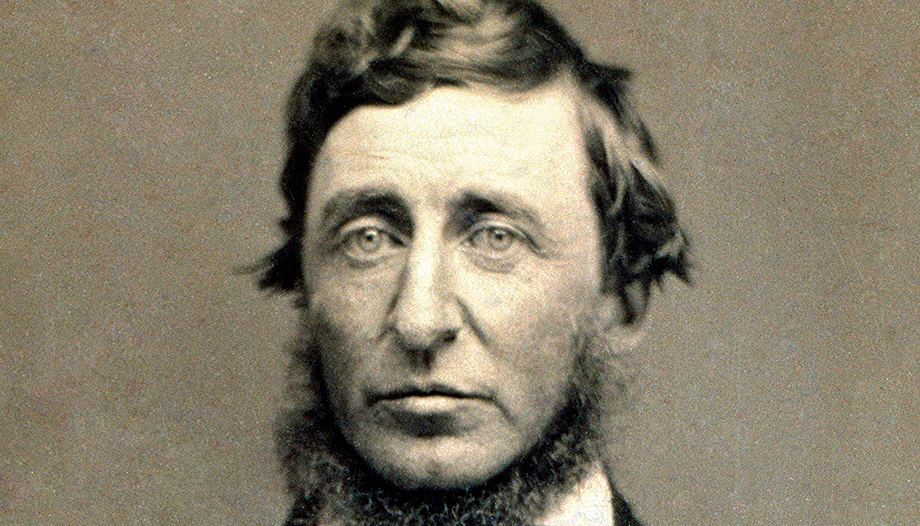July 12 marked the 200th anniversary of Henry David's birth. Thoreau. He is an original thinker, a pioneer of ecology and the defense of the natural environment. Thoreau is for many a central element of the American identity.
The life of Thoreau, born in Concorde, Massachusetts, the son of a pencil maker, may seem unremarkable, but it is remarkable for its authenticity. He was a personal friend of prominent thinkers of his time, especially Ralph Waldo Emerson: both were members of the Transcendentalist Club. He devoted his whole life to thinking and writing, becoming a great essayist, poet and philosopher, author of numerous works in which he expounds his ideas on history, the relationship between nature and the human condition, the defense of abolitionism, and his critical stance against taxes or development.
Two of his works stand out for their important influence on today's world: the essay On the duty of civil disobedience (1849), in which he defends the right to insubordination in the face of an unjust state - which will profoundly influence Gandhi and Martin Luther King.- and the work Walden, or life in the woods (1854), a notable precedent of modern environmentalism, which helps to awaken today's concern for the relationship between human beings and the earth they inhabit.
In 1845 Thoreau moves to the shores of Walden Lake, a wooded lot owned by his friend Emerson, where he builds a small cabin where he lives for a little over two years, while he devotes himself to reading, writing and cultivating the land for his livelihood. It should be noted that he has no electricity or running water, although he is supported in his diet by his relatives and friends. Walden or life in the woods is the result of this personal challenge, of this experience of reflection and contemplation of nature. Thoreau himself puts it this way: "I went to the woods because I wanted to live deliberately, to face only the essential facts of life, and to see if I could not learn what I had to teach, lest when I was about to die I should discover that I had not lived. I did not want to live what was not life; it is so expensive to live; [...] and if it [life in the woods] were mean, to get then all its genuine meanness, and publish to the world its meanness, or if it were sublime, to know it by experience and be able to give a true summary of it on my next outing." (p. 90).
What are these essential facts of life? Thoreau devotes several chapters at the beginning of the book to analyze and describe everyday matters such as clothing, furniture (only three chairs to accommodate no more than two people), the making of bread, the construction of his house, the planting of a vegetable garden. But little by little, he turns his attention to other subjects of his interest: the readings that accompany him, the visits he receives, the sounds, the solitude, the animals, the lagoon...
From the outset, Thoreau poses his back-to-nature experience not as a rejection of civilization, nor as a defense of wilderness, but as a search for an in-between territory that integrates nature and culture. He asks: "¿Would it not be possible to combine the robustness of savages with the intellectuality of civilized man?" (p. 24). For him, nature and the human being are closely related, in such a way that he goes so far as to affirm that he is part of nature and it is only in nature that he can discover himself. "This is a delightful sunset, when the whole body is one sense and absorbs delight from every pore. I come and go with strange freedom in Nature, being a part of herself." (p. 127), Thoreau beautifully describes. And he adds: "In the midst of a gentle rain, while prevailingían isI suddenly became aware of the existence of a sweet and beneficial society in Nature". (p. 128).
A thread of continuity can be seen between the first and the second. natural society of Thoreau, the ideas of Aldo Leopold (1887-1948) and those contained in the much more recent Laudato si' (2015). Leopold states in his masterpiece A Sand County Almanac (1949) that the earth is a community to which we belong. This concept - basic in ecology- implies a break with the idea of nature as something external to human beings, as something alien. On the contrary, Leopold proposes to consider the land as a community in which both the whole and each of the parts have value in its own right: the human being is nature that interprets and shapes the landscape.
As we celebrate the 200th anniversary of Thoreau's birth, the idea of the human being as a member of a biotic community helps us understand the role we must play in the conservation of nature. The teachings of the encyclical Laudato si' are a magnificent invitation to deepen our intimate community with the environment in which we live: "We forget that we ourselves are earth (cf. Gen 2:7). Our own body is made up of the elements of the planet, its air is what gives us breath and its water enlivens and restores us" (n. 2).
The invitation to a return to nature and its contemplation as a whole to which we belong turns the defense of the environment into a moral reflection on the meaning of life and a search for ourselves. This quest is capable of recovering the sacred meaning of nature and, simultaneously, of helping us to assume our responsibility as members of this community. The 200th anniversary of Henry D. Thoreau is an excellent occasion to think more deeply about this.








